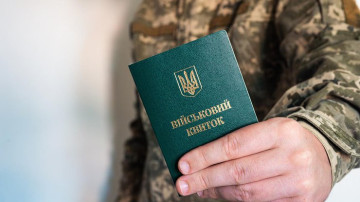How to prove that you need care for a loved one? Assistance of lawyers of the "Consultant" service in obtaining a postponement of mobilization
The question of receiving a deferment from mobilization due to caring for relatives is relevant for many who care for loved ones. Decree of the Cabinet of Ministers of Ukraine No. 930 provides an opportunity to receive a deferment to those who provide permanent care for patients or support persons with disabilities of group I or II. To prove the need for care, a conscript must submit relevant medical documents. In the article, we will consider what documents are required to confirm the need for care, how the lawyers of the "Consultant" service help in submitting applications, and how they can support at each stage of document preparation.
Question
What to do if the commission refused to grant a postponement?
Respond
In case of refusal, you have the right to appeal this decision. The lawyers of "Consultant" can help you prepare an appeal and represent your interests in court.
Caring for loved ones who need constant help is a responsible business that requires not only physical effort, but also certain legal protection. In the conditions of mobilization, many people worry about whether they will be able to stay at home to provide the necessary care for their relatives. CMU Resolution No. 930 clearly stipulates that certain categories of persons may receive a deferment from mobilization if they are engaged in caring for persons with disabilities or serious illnesses. However, obtaining this deferment requires proper preparation of documents and is often not possible without the help of qualified lawyers.
The right to deferment from mobilization is granted to those who constantly care for persons with disabilities or serious illnesses.
The need for care can be confirmed only on the basis of medical documents and decisions of the relevant authorities.
Lawyers of the "Consultant" service help prepare an application and accompanying documents for obtaining a postponement of mobilization.
The legal stages of deferment of care for a disabled person of I or II group include obtaining a medical assessment, submitting a deferment application to the relevant authorities, and receiving an official decision regarding the deferment status.
Who is entitled to deferment from mobilization?
According to the resolution of the Cabinet of Ministers of Ukraine No. 930, the right to deferment from mobilization is granted to persons who are constantly caring for sick relatives or persons with disabilities of the I or II group. This includes caring for parents, children, spouses, and second and third degree relatives. However, in order for this right to be granted, it is necessary to confirm the fact of constant care and the absence of other able-bodied family members who could fulfill this duty.
As stated in the legislation, the key conditions for receiving a deferment from mobilization include:
- Permanent care for persons with disabilities of group I or II.
- Lack of other able-bodied family members who could provide such care.
- Submission to relevant authorities of a complete package of medical documents confirming the state of health of the person in need of care.
The lawyers of the "Consultant" service have extensive experience in solving such issues, helping to prepare all the necessary documents that will prove your need to stay close to your relatives to provide proper care.
Documents for deferred care for a disabled person of I or II group typically include a medical certificate, proof of disability, and an application form submitted to the relevant authorities.
What documents are required for deferred care for care for a disabled person of I or II group:
- Medical certificate on the state of health of a person who needs constant care. This can be a hospital discharge, health certificate, or other document confirming the need for care.
- Documents confirming family ties. This can be a birth certificate, marriage certificate, marital status certificate or other documents proving your relationship with the person you are caring for.
- A statement that there are no other able-bodied family members who could provide this care. This document is submitted to the head of the territorial recruitment and social support center at the place of residence.
In cases where the person in need of care is a disabled person of group I or II, it is also necessary to submit documents confirming the disability status. If there are misunderstandings regarding the list of necessary documents, the lawyers of the "Consultant" service will help clarify the requirements of the law and prepare a complete package of documents.
After collecting all the necessary documents, submit them to the district or city territorial center of recruitment and social support at your place of residence. Your application will be considered in accordance with current legislation, and you will receive a response based on the results of the commission's work.
If the documents are filled out incorrectly or the information is incomplete, you may be denied a deferral. To avoid this, it is recommended to seek legal help from the specialists of the "Consultant" service. Lawyers will advise you on the correct application, collection of necessary medical documents and will provide support in case of additional questions.
Support from lawyers of the "Consultant" service
Legal assistance for deferred care for a disabled person of I or II group is essential in navigating the application process and understanding the rights and entitlements available. Lawyers of the "Consultant" service provide comprehensive services in matters of mobilization and assistance to loved ones who need constant care. In addition to advice, they can also represent your interests before the relevant authorities, helping to prove that your duty of care is reasonable. Specialists know all the nuances of legislation and the process of submitting documents, so you can be sure that your rights will be protected.
By contacting the "Consultant" service, you will receive:
- Legal advice on the procedure for obtaining a postponement of mobilization.
- Assistance in collecting and preparing medical and other necessary documents.
- Representation of interests in the relevant authorities to prove your right to deferment.
Success in resolving the question of granting a deferment from mobilization depends on how well the documents and statements are prepared. Do not delay, because the right legal support will help you avoid mistakes and get the necessary decision as quickly as possible.
Postponement of mobilisation is granted to individuals who have legal grounds, such as health conditions, education, or family circumstances.
If you are in a situation where you need to care for a loved one with a disability or a serious illness, contacting the specialists of the "Consultant" service will help protect your interests. Getting a deferment from mobilization is absolutely legal in such cases, if you fulfill all the legal requirements and prepare the necessary documents. The "Consultant" service will provide you with reliable support and help in solving this issue, giving you the opportunity to stay close to loved ones who need your constant care.
































